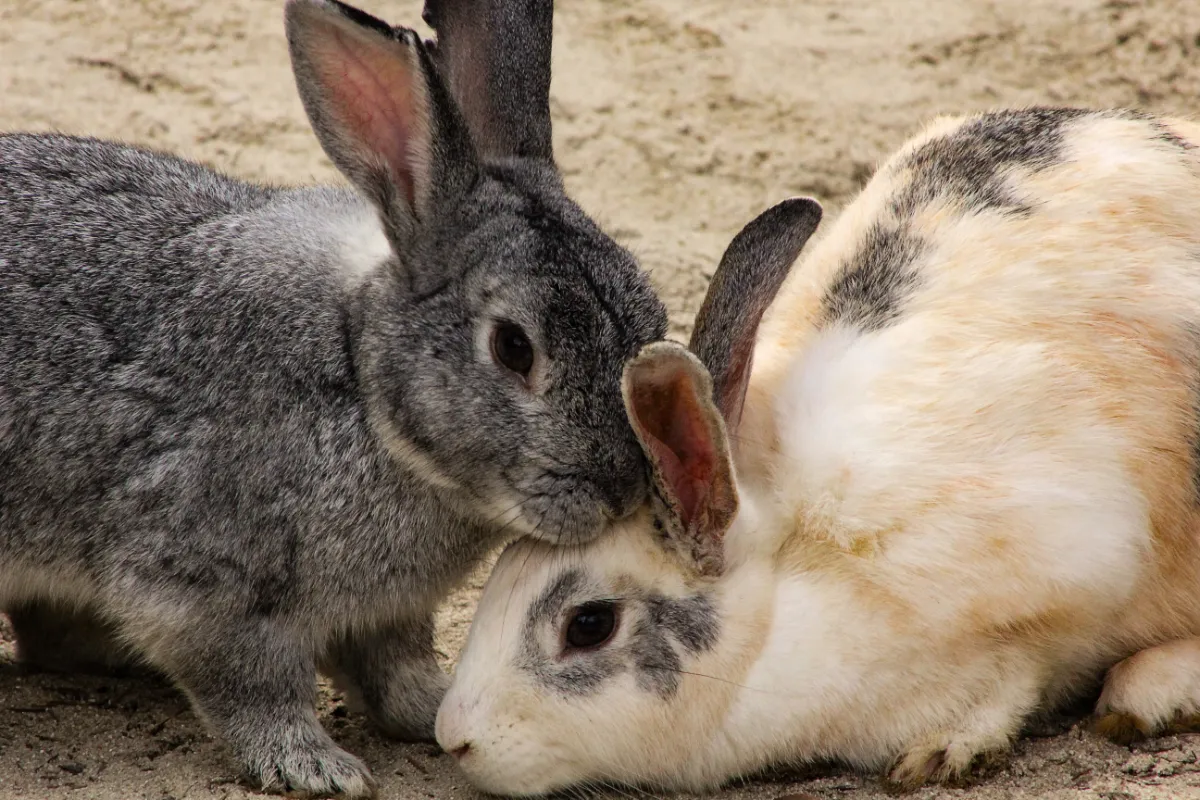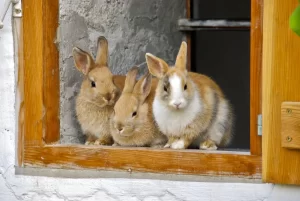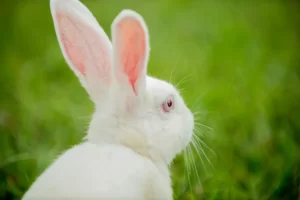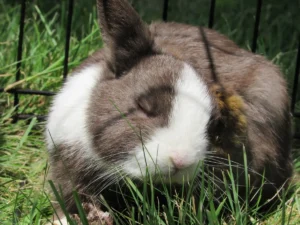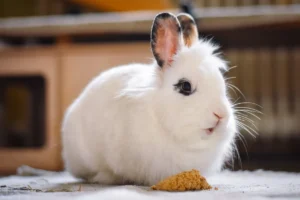Do you ever wonder if wild and domestic rabbits can mate and produce offspring? Well, the answer may surprise you.
In this article, we will delve into the fascinating world of rabbit breeding and explore the genetic compatibility, behavioral differences, and reproductive challenges that come into play.
We will also discuss the possibilities of hybrid offspring and share success stories of crossbreeding.
So, if you’re curious about the future implications and considerations of breeding wild and domestic rabbits, read on!
In This Article
- 1 Key Takeaways
- 2 Genetic Compatibility
- 3 Behavioral Differences
- 4 Reproductive Challenges
- 5 Hybrid Offspring Possibilities
- 6 Crossbreeding Success Stories
- 7 Future Implications and Considerations
- 8 Frequently Asked Questions
- 8.1 Are There Any Health Risks Associated With Breeding Wild and Domestic Rabbits?
- 8.2 How Long Does It Take for a Wild and Domestic Rabbit to Mate and Produce Offspring?
- 8.3 Can Hybrid Offspring From Wild and Domestic Rabbits Reproduce Themselves?
- 8.4 Are There Any Known Negative Effects on the Offspring’s Behavior When Breeding Wild and Domestic Rabbits?
- 8.5 What Are the Legal Implications of Breeding Wild and Domestic Rabbits?
- 9 Conclusion
Key Takeaways
- Breeding wild and domestic rabbits together can lead to breeding limitations and potential health issues for the offspring.
- Wild and domestic rabbits have different genetic backgrounds and adaptations, resulting in incompatible traits and decreased fertility rates.
- Breeding wild and domestic rabbits together can result in unique hybrid offspring with increased fertility rates and improved overall reproductive success.
- Crossbreeding can lead to the development of new rabbit breeds with desired physical attributes and increased vitality, but it can also potentially dilute the genetic diversity of wild rabbit populations and impact their survival.
Genetic Compatibility
You should consider genetic compatibility before breeding wild and domestic rabbits together.
Genetic incompatibility can lead to a variety of breeding limitations and potential health issues for the offspring.
Wild and domestic rabbits have different genetic backgrounds and adaptations, which can result in incompatible traits.
Breeding these two types of rabbits together can lead to decreased fertility rates, higher mortality rates among the offspring, and increased susceptibility to diseases.
Additionally, wild rabbits are generally more aggressive and have different behaviors compared to domestic rabbits.
This can result in issues with mating rituals and social dynamics within the breeding pair.
Therefore, it’s crucial to carefully evaluate the genetic compatibility between wild and domestic rabbits to ensure the health and well-being of the offspring.
Behavioral Differences
If you want to successfully breed wild and domestic rabbits together, it’s important to understand and address their behavioral differences. Wild rabbits have evolved to survive in nature, while domestic rabbits have been bred for specific traits over generations. These differences can affect their communication patterns and social hierarchies.
Wild rabbits rely heavily on nonverbal communication, using body language and scent marking to convey messages to each other. Domestic rabbits, on the other hand, may have less developed communication skills due to their domestication. Understanding and recognizing these communication patterns is crucial when introducing wild and domestic rabbits for breeding purposes.
Additionally, social hierarchies play a significant role in rabbit breeding. Wild rabbits typically live in social groups with established dominance hierarchies. Domestic rabbits may not have the same level of social organization, which can lead to conflicts when breeding with wild rabbits. It’s important to carefully introduce and monitor rabbits from different backgrounds to ensure successful breeding.
Reproductive Challenges
There are several reproductive challenges that can arise when breeding wild and domestic rabbits together.
One of the main concerns is the risk of reproductive disorders. Domestic rabbits have been selectively bred for generations, resulting in certain genetic predispositions that may lead to health issues. When bred with wild rabbits, these genetic disorders can be passed on to the offspring, potentially causing complications during pregnancy or reducing the overall fertility of the rabbits.
Another challenge is the difference in breeding techniques between wild and domestic rabbits. Wild rabbits have evolved to reproduce efficiently in the wild, while domestic rabbits may require more intervention and assistance during the breeding process.
It’s important to carefully consider these challenges and ensure the well-being of both the wild and domestic rabbits when attempting to breed them together.
Hybrid Offspring Possibilities
You can explore the possibilities of hybrid offspring by breeding wild and domestic rabbits together. When these two types of rabbits mate, they can produce offspring that exhibit unique characteristics and traits.
One of the advantages of breeding wild and domestic rabbits is the potential for increased fertility rates. Domestic rabbits have been selectively bred for generations, which can sometimes lead to decreased fertility. However, by introducing genes from wild rabbits, fertility rates can be improved.
Another benefit of hybrid offspring is the phenomenon known as hybrid vigor. This refers to the increased health, size, and vitality that can be observed in hybrid animals. By combining the genetic diversity of wild and domestic rabbits, hybrid vigor can be maximized, resulting in stronger and more resilient offspring.
Crossbreeding Success Stories
The crossbreeding success stories of wild and domestic rabbits are inspiring and showcase the potential for creating unique and thriving offspring. Here are four key points to consider when discussing this topic:
- Genetic diversity: Crossbreeding allows for the introduction of new genes, increasing the genetic diversity within rabbit populations. This can lead to stronger, healthier offspring with enhanced traits and adaptability.
- Adaptation to the environment: Wild rabbits often possess traits that make them better suited for survival in their natural habitat. By crossbreeding with domestic rabbits, these advantageous traits can be introduced into domestic populations, improving their ability to thrive in different environments.
- Health and vigor: Hybrid offspring from crossbreeding can exhibit increased vitality and disease resistance. This can be beneficial for both wild and domestic populations, as it helps to combat challenges such as genetic disorders and susceptibility to certain illnesses.
- Ethical concerns and challenges: While crossbreeding can have positive outcomes, it’s important to consider the potential challenges and ethical implications. It’s crucial to ensure that the process is done responsibly and with proper consideration for the well-being of the animals involved.
Future Implications and Considerations
What are the potential future implications and considerations of crossbreeding wild and domestic rabbits? Crossbreeding wild and domestic rabbits can have both positive and negative consequences.
On one hand, it can lead to the development of new breeds with unique characteristics and traits. This can benefit rabbit enthusiasts and breeders who are looking for specific qualities in their rabbits. However, there are ethical concerns and conservation efforts to consider. Crossbreeding can potentially lead to the dilution of pure wild rabbit populations, which could be detrimental to their survival in the wild.
It is important to carefully consider the impact of crossbreeding on the genetic diversity and conservation of wild rabbits. Conservation efforts should prioritize preserving the integrity of wild rabbit populations while still allowing for responsible and ethical breeding practices.
| Potential Implications | Considerations |
|---|---|
| Development of new breeds | Dilution of wild rabbit populations |
| Unique characteristics and traits | Impact on genetic diversity |
| Benefits for breeders | Conservation efforts |
| Ethical concerns |
Frequently Asked Questions
Are There Any Health Risks Associated With Breeding Wild and Domestic Rabbits?
There are health risks and genetic implications associated with breeding wild and domestic rabbits. It is important to consider these factors before attempting to breed them together to ensure the well-being of the offspring.
How Long Does It Take for a Wild and Domestic Rabbit to Mate and Produce Offspring?
Wild and domestic rabbits can breed, resulting in hybrid offspring. The mating process typically takes a few minutes, and the gestation period lasts around 30 days. However, keep in mind the potential challenges of breeding different rabbit species.
Can Hybrid Offspring From Wild and Domestic Rabbits Reproduce Themselves?
Yes, hybrid offspring from wild and domestic rabbits can reproduce themselves. This breeding can help maintain genetic diversity among rabbit populations, ensuring their long-term survival and adaptability to different environments.
Are There Any Known Negative Effects on the Offspring’s Behavior When Breeding Wild and Domestic Rabbits?
When it comes to breeding wild and domestic rabbits, you might wonder about the negative effects on the offspring’s behavior. Rest assured, there are no known detrimental impacts on their behavior.
What Are the Legal Implications of Breeding Wild and Domestic Rabbits?
When considering breeding wild and domestic rabbits, it is important to understand the legal considerations. Breeding these rabbits can have implications depending on your location and the regulations in place. It is also important to consider the genetic diversity of the offspring.
Conclusion
In conclusion, while wild and domestic rabbits have some genetic compatibility and can breed under certain circumstances, there are significant behavioral and reproductive challenges that can hinder successful breeding.
However, there have been rare instances of hybrid offspring, showcasing the possibilities of crossbreeding. It’s crucial to consider the long-term implications of such breeding and to prioritize the well-being of the rabbits involved.
Continued research and responsible breeding practices can contribute to our understanding of rabbit genetics and conservation efforts.

